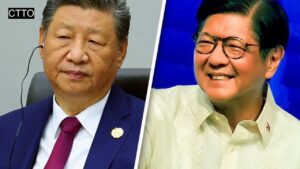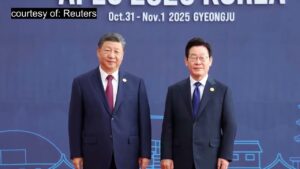The recent Asia-Pacific Economic Cooperation (APEC) Summit in Gyeongju, South Korea, served as a crucial stage for high-stakes diplomacy, underscored by the delicate political tightrope being walked by the Philippines. Despite the persistent and growing maritime dispute with Beijing in the West Philippine Sea, Philippine President Ferdinand Marcos Jr. extended his congratulations to Chinese President Xi Jinping as China formally accepted the APEC chairmanship for 2026. This seemingly simple diplomatic gesture highlights Manila’s calculated strategy to keep economic dialogue channels open while simultaneously bolstering its defense posture with key strategic allies.

The Symbolic Handshake: Diplomacy Amidst Maritime Friction
The key moment of the turnover ceremony at the Hwabaek International Convention Center was the brief but highly scrutinized handshake between President Marcos Jr. and President Xi Jinping. This symbolic interaction occurred as the outgoing chair formally transferred hosting duties to China for the 2026 summit.
President Marcos Jr. later articulated the sentiment behind the gesture, stating: “I congratulated President Xi Jinping as China assumes the APEC chairmanship in 2026, and reaffirmed the Philippines’ commitment to partnership and meaningful cooperation in our region.”
This act of courtesy, while standard in multilateral forums, carries immense weight given the constant friction between Philippine and Chinese vessels in the disputed waters. Political analysts suggest that Marcos’ move was a pragmatic display of the Philippines’ dual strategy:
-
Maintaining Economic Engagement: Utilizing APEC’s purely economic framework to preserve lines of communication and cooperation with Beijing, acknowledging China’s indispensable role in regional trade.
Strategic Differentiation: Clearly separating the geopolitical conflict in the West Philippine Sea (WPS) from broader economic and multilateral engagement, a distinction Marcos Jr. himself emphasized, noting that APEC is not the appropriate venue for discussing defense and political disputes.
This approach is seen by many experts as a necessary and mature diplomatic balancing act. It signals that Manila is serious about seeking peaceful solutions and dialogue across various aspects—including trade and culture—even as it firmly asserts its sovereign rights under international law in the WPS.
China’s 2026 Chairmanship: A Geopolitical Test
China’s upcoming leadership of APEC in 2026 is widely anticipated to serve as a litmus test for President Xi Jinping’s capacity to steer regional economic cooperation amidst intensifying geopolitical rivalries and a rapidly evolving global trade environment.
The summit itself already saw major geopolitical realignments. On the sidelines, President Xi held a closely monitored bilateral meeting with President Donald Trump, their first in-person encounter since the eruption of significant tensions over trade, technology, and security issues years prior. The dynamics between the world’s two largest economies—a critical backdrop to all APEC discussions—will inevitably influence the discourse and direction of the 2026 agenda under Chinese stewardship.
Regional analysts note that China’s handling of its APEC role will be scrutinized, particularly its ability to foster an inclusive and productive environment that manages, rather than escalates, prevailing regional tensions.
Strengthening Defense: A Parallel Move with South Korea

In a powerful demonstration of the Philippines’ commitment to strengthening its self-reliant defense capabilities, President Marcos Jr. simultaneously utilized the APEC sidelines to deepen strategic ties with regional partners.
A key development was his high-level meeting with executives from the South Korean shipbuilding giant Hanwha Ocean. The discussions centered on a comprehensive proposal to support the Philippine Navy’s long-anticipated submarine program. This is a major component of the Philippines’ Armed Forces Modernization Program, aimed at building a credible defense deterrent amidst maritime challenges.
Hanwha Ocean’s proposal is extensive and encompasses several critical aspects:
Submarine Base and MRO Center: Supporting the construction of a dedicated submarine base and the establishment of a local Maintenance, Repair, and Overhaul (MRO) center in the Philippines. This commitment aims to significantly reduce reliance on foreign support for vessel upkeep.
Technology Transfer and Training: Providing advanced training for Filipino naval operators, maintainers, and commanders through the use of sophisticated simulators and integrated systems. Crucially, the plan involves technology transfer and partnerships with local industries to advance the Philippines’ self-reliant defense capability.
Modern Submarine Deployment: Outlining plans for the potential deployment of KSS-III PN-class submarines. These modern vessels would be equipped with state-of-the-art sonar and combat systems, alongside high-end lithium batteries to ensure longer submerged endurance and quieter operations.
This meeting underscores the Philippines’ strategic imperative to develop undersea warfare capabilities. By engaging in concrete defense cooperation with allies like South Korea, Manila is strategically balancing its diplomatic engagement with Beijing under the APEC umbrella with a determined effort to fortify its national security posture, especially in light of the ongoing standoffs in the West Philippine Sea.
Ultimately, the APEC 2025 gathering highlighted the Philippines’ sophisticated foreign policy: a pragmatic commitment to economic multilateralism with all parties, while aggressively pursuing defense modernization and security alliances to safeguard its national interests.





